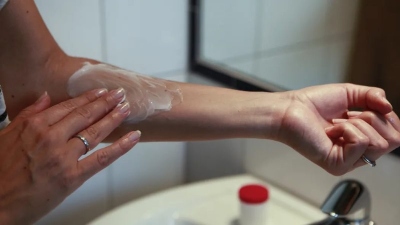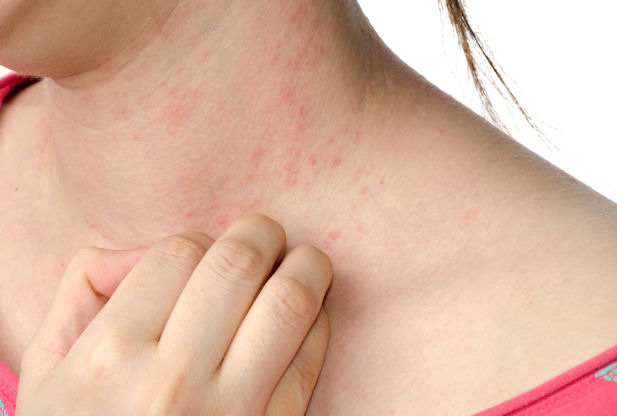What Is Neurodermatitis?
Neurodermatitis, also known as scratch dermatitis, is a type of atopic dermatitis that involves the scratch-itch cycle: an itch causes scratching behavior, increasing itchiness, leading to more itching and scratching. Scaly patches typically appear on the neck, wrists, forearms, and legs.
Lichen simplex chronicus is the localized form of neurodermatitis in which chronic scratching leads to thickening of the skin and for the skin to develop a leathery texture. Neurodermatitis can be triggered by something that irritates the skin or by eczema, psoriasis, stress, or anxiety. The itching may become so intense that it affects the patient’s quality of life. Neurodermatitis is a lifelong condition but with the help of NY Allergy & Sinus Centers, you can manage it with ease.
Symptoms of Neurodermatitis
Signs and symptoms of neurodermatitis include:
- An itchy skin patch or patches
- Leathery or scaly texture on the affected areas
- A raised, rough patch or patches
- Differently colored, such as reddish, brownish, yellowish, gray, or purple. Older patches can appear white or pale in the center, surrounded by darker colors.
The itchiness may come and go or be nonstop. You may even scratch out of habit and while sleeping. You should visit a doctor immediately if your skin becomes painful or looks infected and you have a fever.
Neurodermatitis Diagnosis
Your doctor or one of our allergists may diagnose neurodermatitis by examining the affected skin and determining whether you’ve been itching and scratching. In rare cases, you may need a skin biopsy to confirm the diagnosis. Doctors perform a skin biopsy by taking a small sample of the affected skin to a lab for testing.
Food allergies and neurodermatitis are closely associated. Some studies suggest that food allergies exacerbate skin conditions like neurodermatitis. This dermatitis study has found that dietary factors can exacerbate atopic dermatitis or cause dermatitis due to systemic contact dermatitis. Immediate skin reactions can occur within minutes to hours of food exposure. Neurodermatitis and other conditions may flare anywhere from hours to days later. That’s why the allergists at NY Allergists & Sinus Centers work hard to treat food allergies.
Neurodermatitis Treatment
To treat neurodermatitis, you must stop scratching. We understand that this is difficult for patients suffering from severe neurodermatitis, but it is necessary to heal any wounds. Along with not scratching, anti-itch creams and corticosteroids can help soothe your symptoms. Corticosteroids and capsaicin help reduce redness, swelling, itching, and tenderness while softening thick skin. Be sure to contact our allergists to determine which creams to use.
If scratching leads to an infection, your physician or allergist can prescribe antibiotics. Antibiotics can be applied to the skin or taken orally. Along with antibiotics, coal tar preparations offer some relief. This type of medicine causes the skin to shed dead cells and slows the growth of new cells. Patients can place it directly on their skin or add it to their baths.

We recommend moisturizing daily, cool compresses or baths with colloidal oatmeal, and wearing loose-fitting clothing to relieve itching. You should also keep fingernails short to limit the damage caused by scratching.
If you are concerned about neurodermatitis, the specialists at NY Allergy & Sinus Centers are here to help. Our doctors and associates will perform necessary testing and work with you to reach an accurate diagnosis. We also offer personalized treatment plans to alleviate your symptoms and help you get back to normal. Call us today at (212) 686-6321 or book an appointment online.
Neurodermatitis Frequently Asked Questions
Can Foods Trigger Neurodermatitis?
Certain foods can trigger neurodermatitis. Nuts, eggs, and dairy products are most likely to flare neurodermatitis.
How Is Neurodermatitis Diagnosed?
A physician can diagnose neurodermatitis by examining the affected skin. In rare cases, they will perform a skin biopsy for a more accurate diagnosis.
How Is Neurodermatitis Treated?
Doctors may use a combination of corticosteroids, antihistamines, antibiotics, and moisturizers to treat neurodermatitis. Consult with our NYC allergists for a personalized treatment plan.
How Long Does Neurodermatitis Last?
Neurodermatitis is a lifelong skin condition. However, you may experience itching in cycles in which you itch for a certain amount of time followed by relief.
Is Neurodermatitis Hereditary?
Though neurodermatitis causes are not completely understood, genetic factors may play a role. Talk to your doctor about how you can possibly prevent neurodermatitis.
What Causes Neurodermatitis?
The cause of neurodermatitis is unknown. However, some things, such as allergies, may trigger neurodermatitis. Treating your allergies and avoiding other triggers may reduce neurodermatitis flares.
What If Scratching Has Caused A Wound?
If scratching due to neurodermatitis has caused a wound wrap a dressing over the area. Refrain from scratching or rubbing the wound any further.
What Is Lichen Simplex Chronicus?
Lichen simplex chronicus is a common form of chronic neurodermatitis that presents as dry, patchy areas of skin that are thick and scaly. Repetitive scratching or rubbing can worsen lichen simplex chronicus.
What Is The Difference Between Atopic Dermatitis And Neurodermatitis?
Atopic dermatitis is usually widespread, meaning it affects most parts of the body. Neurodermitis is usually confined to one or two patches of skin, and it rarely goes away without treatment.
Who Is Most Likely To Get Neurodermatitis?
People between 30 years old and 50 years old are more likely to contract neurodermatitis. Women are also more likely than men to suffer from neurodermatitis. Researchers have also found that family members with histories of other skin diseases, including eczema and contact dermatitis, are more likely to develop neurodermatitis.

